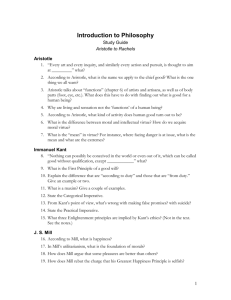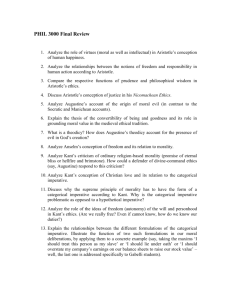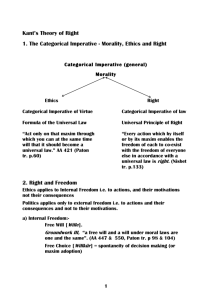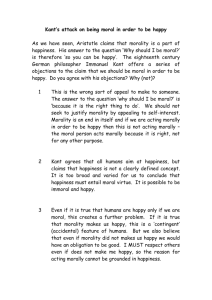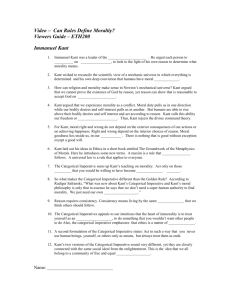Kant vs. Mill Deontology vs. Utilitarianism
advertisement
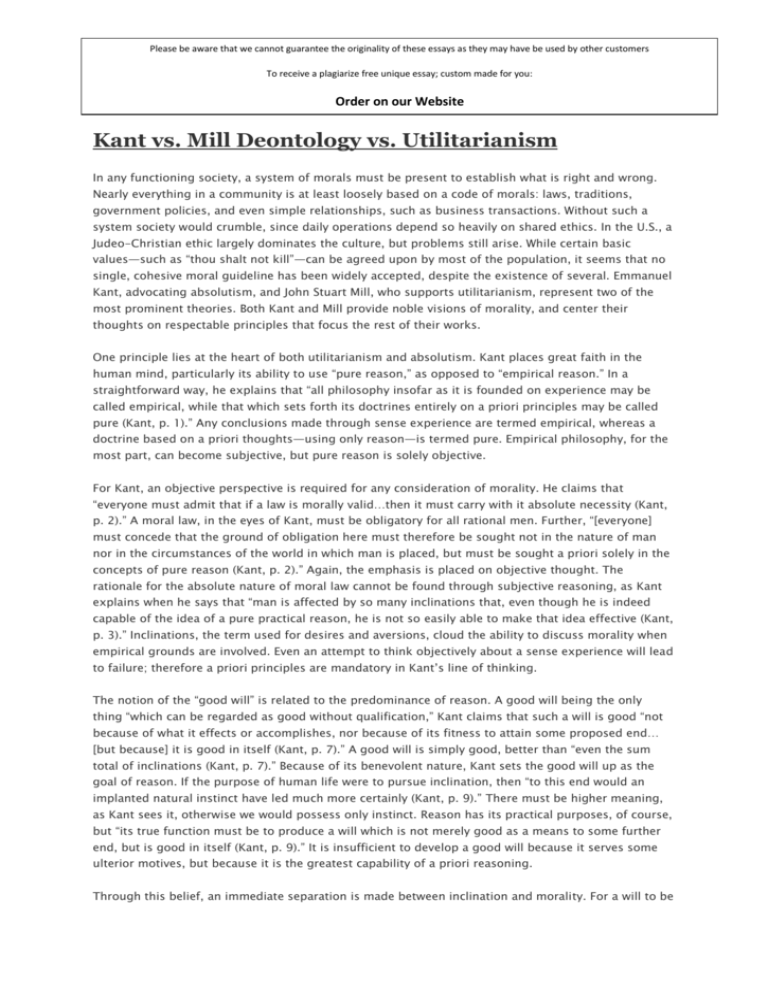
Please be aware that we cannot guarantee the originality of these essays as they may have be used by other customers To receive a plagiarize free unique essay; custom made for you: Order on our Website Kant vs. Mill Deontology vs. Utilitarianism In any functioning society, a system of morals must be present to establish what is right and wrong. Nearly everything in a community is at least loosely based on a code of morals: laws, traditions, government policies, and even simple relationships, such as business transactions. Without such a system society would crumble, since daily operations depend so heavily on shared ethics. In the U.S., a Judeo-Christian ethic largely dominates the culture, but problems still arise. While certain basic values—such as “thou shalt not kill”—can be agreed upon by most of the population, it seems that no single, cohesive moral guideline has been widely accepted, despite the existence of several. Emmanuel Kant, advocating absolutism, and John Stuart Mill, who supports utilitarianism, represent two of the most prominent theories. Both Kant and Mill provide noble visions of morality, and center their thoughts on respectable principles that focus the rest of their works. One principle lies at the heart of both utilitarianism and absolutism. Kant places great faith in the human mind, particularly its ability to use “pure reason,” as opposed to “empirical reason.” In a straightforward way, he explains that “all philosophy insofar as it is founded on experience may be called empirical, while that which sets forth its doctrines entirely on a priori principles may be called pure (Kant, p. 1).” Any conclusions made through sense experience are termed empirical, whereas a doctrine based on a priori thoughts—using only reason—is termed pure. Empirical philosophy, for the most part, can become subjective, but pure reason is solely objective. For Kant, an objective perspective is required for any consideration of morality. He claims that “everyone must admit that if a law is morally valid…then it must carry with it absolute necessity (Kant, p. 2).” A moral law, in the eyes of Kant, must be obligatory for all rational men. Further, “[everyone] must concede that the ground of obligation here must therefore be sought not in the nature of man nor in the circumstances of the world in which man is placed, but must be sought a priori solely in the concepts of pure reason (Kant, p. 2).” Again, the emphasis is placed on objective thought. The rationale for the absolute nature of moral law cannot be found through subjective reasoning, as Kant explains when he says that “man is affected by so many inclinations that, even though he is indeed capable of the idea of a pure practical reason, he is not so easily able to make that idea effective (Kant, p. 3).” Inclinations, the term used for desires and aversions, cloud the ability to discuss morality when empirical grounds are involved. Even an attempt to think objectively about a sense experience will lead to failure; therefore a priori principles are mandatory in Kant’s line of thinking. The notion of the “good will” is related to the predominance of reason. A good will being the only thing “which can be regarded as good without qualification,” Kant claims that such a will is good “not because of what it effects or accomplishes, nor because of its fitness to attain some proposed end… [but because] it is good in itself (Kant, p. 7).” A good will is simply good, better than “even the sum total of inclinations (Kant, p. 7).” Because of its benevolent nature, Kant sets the good will up as the goal of reason. If the purpose of human life were to pursue inclination, then “to this end would an implanted natural instinct have led much more certainly (Kant, p. 9).” There must be higher meaning, as Kant sees it, otherwise we would possess only instinct. Reason has its practical purposes, of course, but “its true function must be to produce a will which is not merely good as a means to some further end, but is good in itself (Kant, p. 9).” It is insufficient to develop a good will because it serves some ulterior motives, but because it is the greatest capability of a priori reasoning. Through this belief, an immediate separation is made between inclination and morality. For a will to be good, it cannot be used in the pursuit of any end. In fact, Kant states that a good will is only truly displayed when a person ignores inclination to follow duty. Any action that appears to be moral, but is taken because it will achieve a certain end, is not a demonstration of the good will. Suicide is given as an example, since Kant believes that preserving one’s life is a duty: [size=12:e12c8b6ac5][size=9]“To preserve one’s life is a duty; and furthermore, everyone has also an immediate inclination to do so. But on this account the often anxious care taken by most men for it has no intrinsic worth, and the maxim of their action has no moral content…On the other hand…if an unfortunate man, strong in soul and more indignant at his fate than despondent or dejected, wishes for death and yet preserves his life without loving it…then his maxim indeed has moral content (Kant, p. 10).”[/size:e12c8b6ac5][/size] By maxim, Kant merely refers to the basic justification for an action. So what he illustrates in this model is the difference between a moral action done because of inclination, and a true moral action of the good will, which is done out of duty. Again, it is shown that the good will is good in itself, as are any of the actions that it wills. Using this as his basis, Kant begins to derive his central principle of morality. Staying true to the good will, he states that a person “should never act except in such a way that [one] can also will that my maxim should become a universal law (Kant, p. 14).” For any moral action, a person should make his decision as if the action would become a universal law for all rational beings. Thereby, by attempting to make an exception even once, the “maxim would necessarily destroy itself just as soon as it was made a universal law (Kant, p. 15).” If a universal law is not followed absolutely, it can no longer be called a universal law. Kant refers to this approach as the categorical imperative. When “the action is represented as good in itself, and hence as necessary in a will which of itself conforms to reason as the principle of the will, then the imperative is categorical (Kant, p. 25).” Any rational person that possesses a good will necessarily follow the categorical imperative, because it mandates actions that are good in themselves. When each individual holds the ability to recognize which maxims constitute a universal law, the categorical imperative must be expanded. Since every rational being thinks of himself as an end in himself, as far as morality is concerned, all people must “act in such a way that [they] treat humanity, whether in your own person or in the person of another, always at the same time as an end and never simply as a means (Kant, p. 36).” All rational beings hold moral worth, and should be treated as ends. Furthermore, “the third practical principle of the will… [is] the idea of the will of every rational being as a will that legislates universal law (Kant, p. 36.).” Kant sees an individual as an autonomous moral being who answers only to his own will, which is capable of recognizing universal law. From this, a final aspect of the categorical imperative is added: “The concept of every rational being as one who must regard himself as legislating universal law by all his will’s maxims…leads to another very fruitful concept…that of a kingdom of ends (Kant, p. 37).” This kingdom of ends appears to be Kant’s ultimate goal. The concept is that of a community in which each person simultaneously lives according to the universal laws that he legislates, and the common laws that are established in the kingdom of ends. Any moral action that a person takes should be considered worthy of the laws that exist in this theoretical kingdom. Finally, Kant declares his principle that lies within all of this: the principle of autonomy. Any person that employs pure reason can follow the categorical imperative. This means that each person has moral autonomy; everyone has the ability to determine a just, universal law as long as they possess the good will. Utilitarians, on the other hand, follow a principle that is much less involved. John Stuart Mill, in his essay Utilitarianism, states very plainly that the principle of utility, or greatest happiness, “holds that actions are right in proportion as they tend to promote happiness, wrong as they tend to produce the reverse of happiness (Mill, p. 137).” Simply put, an action that encourages happiness and avoids pain is considered moral. Mill rejects the Kantian tendency to separate morality and happiness. Happiness is morality, for utilitarians, including both physical pleasure and intellectual pleasure, not to mention lack of pain. Indeed, Mill claims that most “assign to the pleasures of the intellect, of the feelings and imagination, and of the moral sentiments, a much higher value as pleasure than to those of mere sensation (Mill, p. 138).” The benefits possible from mental stimulation are considered far more valuable than physical stimulation. Mill espouses the importance of a cultivated mind for this reason, among others. In his view, “a cultivated mind…finds sources of inexhaustible interest in all that surrounds it; in the objects of nature, the achievements or art, the imaginations of poetry… (Mill, p. 145).” Through education, humans can tap into the unlimited sources of intellectual stimulation that have been provided by civilization. Beyond the cultivation of the mind, however, education and socialization also bring about another important aspect of Mill’s moral person. Kant places faith in the human mind, in particular the use of a priori reasoning to establish objective moral principles. Mill rejects this belief, stating that “moral feelings are not innate, but acquired,” and that they may arise naturally over time (Mill, p. 163). With help, morality can be “brought by cultivation to a high degree of development (Mill, p. 163).” Such reasoning is important to Mill, but he is unwilling to accept the Kantian view that pure reason can lead to a good will. This difference is important, and plays a role in other aspects of Mill’s utilitarianism. Since morals, according to Mill, can be inculcated into people, he also believes that education can instill other values in humans. If society is indoctrinated with the proper values, eventually “the feeling of unity with our fellow creatures shall be…as deeply rooted in our character, and to our own consciousness as completely a part of our nature, as the horror of crime is in an ordinarily well brought-up young person (Mill, p. 159-160).” Since Mill believes that morals don’t occur naturally, he advocates fostering useful ideas in people. Furthermore, Mill declares that “to do as one would be done by, and to love one’s neighbour as oneself, constitute the ideal perfection of utility (Mill, p. 148).” Utilitarians believe that the golden rule should dictate people’s behavior, which gives some insight into the type of ideals that they wish to promote in society. Continuing on in the same passage, Mill says: “As the means of making the nearest approach to this idea, utility would enjoin, first, that laws and social arrangements should place the happiness, or…the interest, of every individual, as nearly as possible in harmony with the interest of the whole; and secondly, that education and opinion, which have so vast a power over human character, should so use that power as to establish…an indissoluble association between [individual] happiness and the good of the whole (Mill, p. 148).” The first part of this statement shows that utilitarians work towards to good of the whole, while still attempting to protect the interests of the individual. As for the second part, this is reiterating the role that education and socialization should play in spreading morality. Mill refuses to divide happiness and morals, instead insisting that the development of happiness for the most possible people is the highest moral goal. Since Grounding for the Metaphysics of Morals was written before Mill, Kant gives no direct opposition to his utilitarian view. He does, however, oppose moral systems that are based on heteronomy, rather than autonomy. Anything other than autonomy means that morality will be based on something outside of the will; hence it goes against the categorical imperative. Such a framework, “whether it rests on inclination or on representations of reason, admits only of hypothetical imperatives: I ought to do something because I will something else (Kant, p. 45).” No matter what the goal of the heteronymous morality, it will be based on something less objective than the categorical imperative. From Kant’s perspective, that makes it less moral. On the other hand, Mill could argue that individuals hold no autonomous moral status for two reasons. First, the happiness of the overall community has more importance than a single person, as long as the individual’s interests are close to being in “harmony with the interest of the whole (Mill, p. 148).” Second, there is no innate moral thought, so the categorical imperative is nearly impossible without education and socialization. Such a developed view would almost certainly require cultivation of the mind, which would unavoidably include some socialization. In addition, a flaw in absolutism is that it claims to pay no heed to ends, but any system of morals must have some end in mind. Without en end, no purpose can be found in creating and following such a system of morals. This internal argument against absolutism is inescapable. Two issues stand above the rest in the debate between absolutism and utilitarianism. These two issues, which are interrelated, are autonomy and the innate nature of morality. Whether or not an individual can truly develop moral principles a priori is a central part of Kantian absolutism, and a possibility that Mill rejects in his discussion of utilitarianism. Unfortunately, such a question may be unanswerable. While Kant offers a noble ideal in his “kingdom of ends,” Mill offers a much more appealing approach to morality by placing happiness as the ultimate goal.
